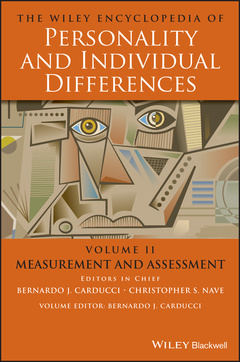The Wiley Encyclopedia of Personality and Individual Differences, Measurement and Assessment, Volume 2 The Wiley Encyclopedia of Personality and Individual Differences Series
Rédacteurs en Chef : Carducci Bernardo J., Nave Christopher S.

Volume 2, Measurement and Assessment of The Wiley Encyclopedia of Personality and Individual Differences
The Encyclopedia of Personality and Individual Differences (EPID) is organized into four volumes that look at the many likenesses and differences between individuals. Each of these four volumes focuses on a major content area in the study of personality psychology and individuals' differences. The first volume, Models and Theories, surveys the significant classic and contemporary viewpoints, perspectives, models, and theoretical approaches to the study of personality and individuals' differences (PID). The second volume on Measurement and Assessment examines key classic and modern methods and techniques of assessment in the study of PID. Volume III, titled Personality Processes and Individuals Differences, covers the important traditional and current dimensions, constructs, and traits in the study of PID. The final volume discusses three major categories: clinical contributions, applied research, and cross-cultural considerations, and touches on topics such as culture and identity, multicultural identities, cross-cultural examinations of trait structures and personality processes, and more.
- Each volume contains approximately 100 entries on personality and individual differences written by a diverse international panel of leading psychologists
- Covers significant classic and contemporary personality psychology models and theories, measurement and assessment techniques, personality processes and individuals differences, and research
- Provides a comprehensive and in-depth overview of the field of personality psychology
The Encyclopedia of Personality and Individual Differences is an important resource for all psychology students and professionals engaging in the study and research of personality.
Contributor Biographies xi
Theoretical and Methodological Issues in Personality Research: General Concerns and Considerations 1
Cross-Cultural Research, Methodological Issues of 13
Idiographic vs. Nomothetic Research 19
Longitudinal Research 25
Person-Situation Interactions 31
Researcher Biases 37
Unconscious Processes 43
Cognitive Methods in Personality Research 49
Experimental Approaches 55
Historiometry 61
Internet Research in Personality 67
Linguistic Analysis in Personality Research (including the Linguistic Inquiry and Word Count) 73
Personal Narratives 79
Personality Development Across the Lifespan 85
Personality in Non-Humans 91
Physical and Virtual Spaces 97
Psychobiography and Case Study Methods 103
Factor Analysis in Personality Research 109
Meta-analysis in Personality Research 113
Multiple Regression in Personality Research 119
Path Analysis in Personality Research 125
Size Effects in Personality Research 131
Structural Equation Modeling in Personality Research 137
Acculturation Considerations in Personality Assessment 143
Computer Adaptive Testing (CAT) 149
Culture-Free/Fair Intelligence Testing 153
Item Analysis 159
Reliability, Issues of 165
Issues of Response Styles 169
Responsibilities of Testing Professionals 175
Rights of Test-takers 181
Validity, Issues of 187
Aggressiveness, Assessment of 191
Anger and Hostility, Assessment of 197
Anxiety, Assessment of 203
Jealousy, Assessment of 209
Love and Attraction, Assessment of 215
Masculinity and Femininity 219
Narcissism, Assessment of 225
Optimism/Pessimism, Assessment of 231
Positive and Negative Affective States, Assessment of 237
Self-Esteem, Assessment of 243
Self-monitoring (to include the Self-Monitoring Scale), Assessment of 249
Self-regulation, Assessment of 255
Self-consciousness, Assessment of 261
Subjective Well-being, Assessment of 267
California Psychological Inventory (CPI) 273
Dimensional Assessment of Personality Pathology (DAPP) 279
Eysenck Personality Questionnaire-Revised 283
Millon Clinical Multiaxial Inventory (MCMI) 287
Minnesota Multiphasic Personality Inventory (MMPI) 293
Multidimensional Personality Questionnaire 309
Myers-Briggs Type Indicator 315
Nonverbal Personality Questionnaire (NPQ) 321
Objective-Analytic Test Battery (OA TB) 325
Personality Assessment Inventory (PAI) 329
Revised NEO Personality Inventory (NEO-PI-R) 335
Zuckerman-Kuhlman Personality Questionnaire (ZKPQ) 351
Projective Techniques, General Features and Methodological Issues 357
Assessing Implicit Motives 363
The Rorschach Test 367
Tell-Me-A-Story (TEMAS) 377
Thematic Apperception Test 381
Word-Related and Figure-Construction Projection Techniques 387
Behavioral Genetics, General Features and Methodological Issues 393
Biochemical Assessment 397
Human Genome Project and Personality 403
Model Fitting 409
Twin Studies in Personality Research 415
Behavioral Assessment Techniques, General Features and Methodological Issues 421
Behavioral Assessment Techniques of Personality in Children 427
Cognitive-Behavioral and Cognitive–Self-Report Assessment Techniques 433
Self-monitoring Behavioral Assessment Techniques 439
Assessment of Intelligence, General Features and Methodological Issues 447
Stanford-Binet Intelligence Scale: Fifth Edition 451
Wechsler Adult Intelligence Scale-IV (WAISC-IV) 457
Wechsler Intelligence Scale for Children (WISC) 465
Wechsler Preschool and Primary Scale of Intelligence (WPPSI) 473
Intelligence-Personality Association, Assessment of 477
Abilities, General Features and Methodological Issues 483
Assessment of Antisocial Behavior 487
Career and Vocational Interests and Abilities, Assessment of 493
Cognitive Aging, Assessment of 499
Creativity, Assessment of 503
Educational Ability Testing (GRE/MAT/MCAT/LSAT) 509
Emotional Intelligence, Assessment of 513
Genius, Assessment of 519
Mental Competency, Assessment of 523
The Wechsler Memory Scales (WMS-IV) 529
Anne Anastasi 533
Jens B. Asendorpf 543
James N. Butcher 547
Charles S. Carver 553
Lee J. Cronbach 557
Turhan Canli 563
Philip J. Corr 569
John M. (Jack) Digman 573
John E. Exner, Jr. 577
Oliver P. John 581
Henry A. Murray 587
Jack A. Naglieri 597
Warren T. Norman 601
William Revelle 605
Michael F. Scheier 611
Mark Snyder 617
David Wechsler 621
Index 625
Bernardo J. Carducci, PhD, was professor of psychology at Indiana University Southeast where he taught classes on personality psychology and introductory psychology for 37 years, and was director of the IU Southeast Shyness Research Institute. He authored several books on shyness, including The Pocket Guide to Making Successful Small Talk: How to Talk to Anyone Anytime Anywhere About Anything and Shyness: A Bold New Approach. His text, Psychology of Personality: Viewpoints, Research, and Applications, is currently in its third edition.
Christopher Nave, PhD, is the Managing Director of the interdisciplinary Master of Behavioral and Decision Sciences program at the University of Pennsylvania. His areas of expertise include multi-method design, behavioral observation, personality stability, personality judgment and well-being. His publications have appeared in top academic journals and handbooks and have been featured in the popular press.
Date de parution : 02-2021
Ouvrage de 704 p.
17.5x25.2 cm



